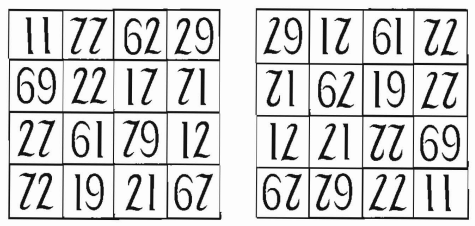
This reversible magic square comes from Henry Dudeney’s Canterbury Puzzles.
Each row, column, and diagonal in the square totals 179.
Thanks to some clever calligraphy, this remains true when the square is turned upside down.

This reversible magic square comes from Henry Dudeney’s Canterbury Puzzles.
Each row, column, and diagonal in the square totals 179.
Thanks to some clever calligraphy, this remains true when the square is turned upside down.
In 2000, Guatemalan police asked Christmas revelers not to fire pistols into the air. “Lots of people die when bullets fall on their heads,” National Civilian Police spokesman Faustino Sanchez told Reuters. He said that five to ten Guatemalans are killed or injured each Christmas by falling bullets.

J.B.S. Haldane was once asked what his study of biology had taught him about God.
He said that the Creator, if he exists, has “an inordinate fondness for beetles.”
Howard W. Bergerson devised these:

As in a word square, the “columns” in each sum are identical with the “rows.”
12/07/2021 UPDATE: Reader James Foster finds that 20 such squares are possible. (Thanks, James.)
Asked whether he would give his life to save a drowning brother, J.B.S. Haldane said, “No, but I would to save two brothers or eight cousins.”

In 1877, five-year-old Bertrand Russell asked his Aunt Agatha, “Aunty, do limpets think?”
She said, “I don’t know.”
He said, “Then you must learn.”

Erl E. Kepner patented a bewildering object in 2002 — a one-sided coffee mug:
To help us see the unique properties of the beverage vessel, let’s pretend that the vessel is made of astonishingly thin material. This is a ‘thought experiment’, not a real experiment, where you actually physically do anything. Note that the only edge on the vessel is the rim that your lips would touch if you drank coffee from it. The rim of the container would be a very sharp edge while the areas where the container and the hollow handle come together would be smooth curved shapes. Now pretend that you have a very tiny little black ball shaped magnet located on the surface of the vessel somewhere and another little tiny white ball magnet located on the opposite side of the vessel material. If one were to (mentally) move either the black or white ball magnet, it would cause the white or black ball magnet to move also. One could move the black or white ball magnets, one at a time, along the vessel surface so that white ball magnet ended up where the black ball magnet was initially located and the black ball magnet was where the white ball magnet originally was. This can be accomplished without having either of the magnets pass over the vessel rim, which is the only edge of the vessel. Other than the Klein Bottle, no other hollow shape has this property. Another way to envision or demonstrate the unique properties of this shape is to point out the fact that a little bug can crawl from any point on the surface of the vessel to any other point on the surface of the vessel without crossing over an edge. Bugs cannot do this on a normal coffee cup or any other three-dimensional shape that we use in our daily lives.
“The future marketing of the beverage container of this invention will use these sorts of interesting points to stimulate interest among technically well educated people and everyday people with an innate curiosity and appreciation for the wonder and beauty of mathematics and nature.”
See Carry-All and the Klein bottle recycling center.

Suspect A has shot a man through the heart during the last half minute. But Suspect B shot him through the heart during the preceding 1/4 minute, Suspect C shot him through the heart during the 1/8 minute before that, and so on. Assuming that a bullet through the heart kills a man instantly, the victim must already have been dead before any given suspect shot him.
Indeed, notes José Benardete, he cannot be said to have died of a bullet wound.
Help me be MANIC so I may be joyous though the results are equivocal.
Help me be DEPRESSIVE for when a prediction is verified, I must know that it will not later be confirmed.
Help me be SADISTIC so I suffer not though the subjects be sorely anguished.
Help me be MASOCHISTIC for even the most obstinate experimental animal should be a pleasure to me.
Help me be PSYCHOPATHIC to quiet the guilt when I tell loved ones that the experiment is going well.
Help me be SCHIZOPHRENIC to sustain myself by finding hopeful trends in random data.
Help me be PARANOID so I can see in the hostile attitudes of others the supremacy of my own work.
Help me to have ANXIETY ATTACKS so that even on holidays I find myself toiling in the laboratory.
And finally,
Help my wife get a job! for when I cross over the shadowy border of normalcy, somebody will have to support the kids. Amen.
— R.A McCleary in the Worm Runner’s Digest, November 1960